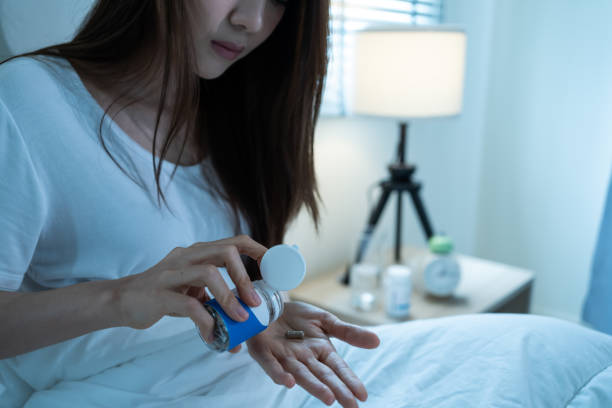Now that you understand the risks and side effects when using sleeping pills and
aids, let’s discuss what options are available on the market. It’s important to
mention that while these products usually come in a wide variety of brand names,
they all fall into one of the four categories below.
Melatonin
Melatonin is a hormone that’s naturally produced within the brain’s pineal gland.
When it’s daytime, the retinas can sense natural light, which tells the brain to
secrete hormones such as cortisol that promote a feeling of alertness and
wakefulness. As the sunlight fades, the pineal gland receives signals to secrete
melatonin to make you feel relaxed and tired.
Certain factors can lead to a decrease in melatonin levels. When this occurs, many
people turn to melatonin supplements for help. Available over-the-counter, this
sleep aid is often prescribed or recommended to treat some conditions. This includes
sleep disorders in children, circadian rhythm sleep disorder, shift work disorder,
and delayed sleep-wake phase disorder. It’s also great for travelers who are
suffering from jet lag.
Diphenhydramine
Diphenhydramine, or its most common brand name
Benadryl, is an FDA-approved antihistamine. Though most people recognize this drug
marketed as Benadryl, it’s also contained in other OTC sleep aids like Nytol,
ZzzQuil, Advil PM, Tylenol PM, and Excedrin PM.
Though this drug works well for sleep problems in the short term, some studies have
found that an alarming amount of older adults use diphenhydramine for self-care or
insomnia treatment. This is primarily due to the fact that older people are more
prone to sleeping problems because of health conditions like diabetes, stroke,
hypertension, and heart disease. However, taking this drug daily is especially
problematic for these folks because as you age, your metabolism slows. In other
words, the medication’s half-life is extended, so effects are prolonged, which can
lead to a residual sedative effect when taken in the evening.
It’s important to understand that when taking this medication, it can leave you
feeling tired the next day and cause psychomotor impairments. In fact, the FDA warns
that high doses of diphenhydramine can cause heart attack, seizures, coma, and even
death. Thus, young adults and teenagers should also use caution with this sleeping
aid.
Doxylamine
Doxylamine succinate is also an antihistamine known to elicit sedative effects. This
drug is an excellent option for the short-term treatment of insomnia and can be
added to decongestants to alleviate specific cold symptoms. Doxylamine is more
widely recognized under brand names such as Medi-Sleep, Good Sense Sleep Aid, and
Unisom Sleep Tabs.
Please note that if your symptoms or insomnia persist for more than two weeks, you
should contact your doctor about other prescription options. Much like
diphenhydramine, studies have found that seniors often chronically take these
medications, which can lead to adverse effects – especially if the person also
consumes alcohol daily.
Valerian
Valerian, or valerian root, is an herb that’s often found in mild sedatives used to
treat anxiety and insomnia. Though researchers don’t quite understand the
functionality of this herb, it’s believed to interact with serotonin, GABA, and
adenosine receptors. Since valerian is marketed and sold as a dietary supplement,
it’s not subjected to the same FDA-level approval as other OTC sleeping pills.
Hence, the composition of valerian root sleep aids will vary by brand.
Just keep in mind that valerian, when taken in high doses at nighttime, can lead to
morning sleepiness. However, the standard amount of 600 mg has not been found to
negatively impact alertness, concentration, or reaction time. It’s vital to note
that valerian’s effects on infants and unborn fetuses are unclear, so pregnant women
and nursing mothers should not take this medication unless instructed by their
doctor. The same is true for kids younger than three.






